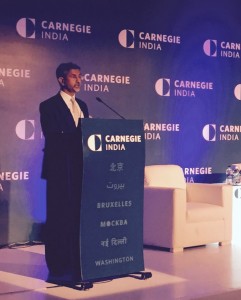
With the Pathankot terror strike renewing the focus on terrorism in India-Pakistan ties, India once again made it clear that terrorism continues to be the central issue in continuing engagement with Pakistan. “Given the challenges of that relationship, we have fared well in keeping the focus firmly on the central issue of terrorism, in maintaining an engagement,” India’s Foreign Secretary S. Jaishankar said at the inauguration of the India centre of the US think tank Carnegie Endowment for International Peace. “The issue of terrorism needs to be addressed effectively as it is hard to say that relationship with Pakistan is normal. This is what puts Pakistan in a different category than other neighbours. So yes, terrorism remains the focal point of our relationship and Pathankot has made it so as well,” Mr Jaishankar said.
The foreign secretary underscored that India’s neighbourhood is a strong priority for New Delhi’s foreign policy initiatives. New Delhi is the sixth international centre of the Carnegie Endowment after Washington, Moscow, Beijing, Beirut and Brussels.
The remarks by Mr Jaishankar came in the backdrop of the visit of Pakistan’s Joint Investigation Team (JIT) to India to conduct probe into the Pathankot attacks. As Pakistan JIT is likely to submit its report to Prime Minister Nawaz Sharif, Pakistani media have claimed that India is indulging in “vicious propaganda” against Islamabad.
Focusing on India’s broad approaches to foreign policy Mr Jaishankar said: “neighbourhood first” was the phrase most heard in India’s foreign policy. “With our neighbours, we have to sharply raise the levels of connectivity.”
Power shifts: Re-assessing India’s interests
Taking a big picture view of India’s foreign policy priorities in a fast-moving world, the country’s top diplomat stressed on adapting to changes in global geopolitical landscape. “There are challenges, but there are also opportunities. The world is changing as we speak, with power shifts underway, new ideologies rising and sovereignty being eroded. But simply because it is complicated, we cannot fall back on passivity as a default position. To do that is to condemn ourselves to be perpetual spectators.
“As Mark Zuckerberg noted, “In a world that is changing really quickly, the only strategy that is guaranteed to fail is not taking risks”. Therefore, assessing and re-assessing where our national interest lies and pursuing it relentlessly is the answer. And it is the scale and scope of how we define that interest that would characterize us,” he said.
Laying out the canvas to facilitate India’s emergence as a leading global player, Mr Jaishankar outlined the need for a more proactive foreign policy posture that can “optimally reconciling the pulls and pressures of global politics.”
“Playing the game on a bigger stage and at a higher level does need more engagement, better understanding and bolder policies. Above all, it requires an adaptation to change, a pre-condition to be able to use it to advantage.”
“Whatever the pace and extent of this change, history has lessons for an aspiring power: leverage the dominant, collaborate with the convergent, and manage the competition,” Mr Jaishankar stressed.
Author Profile
- India Writes Network (www.indiawrites.org) is an emerging think tank and a media-publishing company focused on international affairs & the India Story. Centre for Global India Insights is the research arm of India Writes Network. To subscribe to India and the World, write to editor@indiawrites.org. A venture of TGII Media Private Limited, a leading media, publishing and consultancy company, IWN has carved a niche for balanced and exhaustive reporting and analysis of international affairs. Eminent personalities, politicians, diplomats, authors, strategy gurus and news-makers have contributed to India Writes Network, as also “India and the World,” a magazine focused on global affairs.
Latest entries
 DiplomacyJanuary 5, 2026India walks diplomatic tightrope over US operation in Venezuela
DiplomacyJanuary 5, 2026India walks diplomatic tightrope over US operation in Venezuela India and the WorldNovember 26, 2025G20@20: Africa’s Moment – The Once and Future World Order
India and the WorldNovember 26, 2025G20@20: Africa’s Moment – The Once and Future World Order DiplomacyOctober 4, 2025UNGA Resolution 2758 Must Not Be Distorted, One-China Principle Brooks No Challenge
DiplomacyOctober 4, 2025UNGA Resolution 2758 Must Not Be Distorted, One-China Principle Brooks No Challenge India and the WorldJuly 26, 2025MPs, diplomats laud Operation Sindoor, call for national unity to combat Pakistan-sponsored terror
India and the WorldJuly 26, 2025MPs, diplomats laud Operation Sindoor, call for national unity to combat Pakistan-sponsored terror







